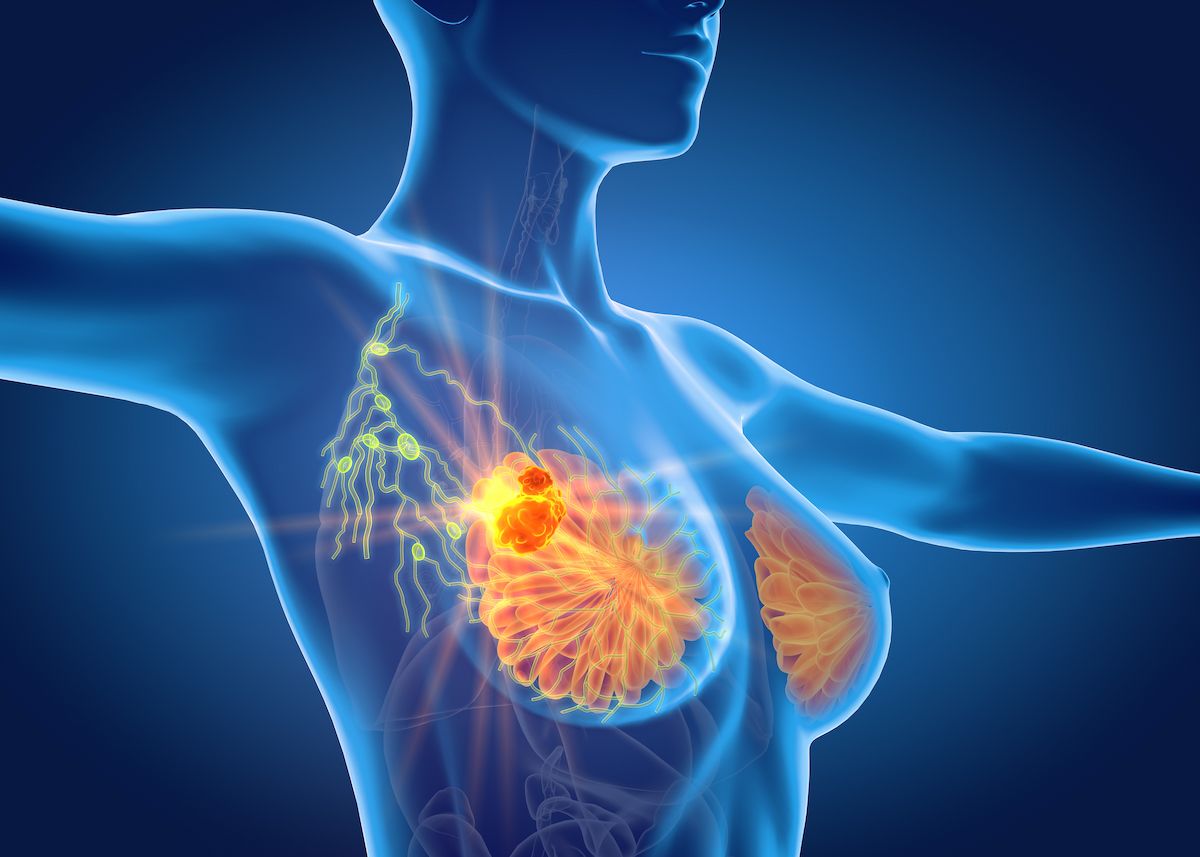EC Approves T-DXd Monotherapy in HR+, HER2-Low/Ultralow Breast Cancer
Results from the phase 3 DESTINY-Breast06 trial demonstrated that trastuzumab deruxtecan (T-DXd) monotherapy improved progression-free survival over chemotherapy in patients with breast cancer.
Trastuzumab deruxtecan monotherapy demonstrated survival benefits compared with chemotherapy in patients with hormone receptor–positive, pretreated breast cancer.

The European Commission has approved fam-trastuzumab deruxtecan-nxki (T-DXd; Enhertu) as monotherapy treatment for adult patients with unresectable or metastatic hormone receptor (HR)–positive, HER2-low or HER2-ultralow breast cancer who were treated with at least 1 endocrine therapy in a metastatic setting and who cannot receive endocrine therapy in the next line of treatment, according to a press release from the developer, Daiichi Sankyo.1
Previously, the European Medicines Agency’s Committee for Medicinal Products for Human Use recommended T-DXd for approval in the aforementioned indication.2 In January 2025, the FDA approved T-DXd for the same patient population.3 The approval is supported by results from the phase 3 DESTINY-Breast06 trial (NCT04494425) from the 2024 American Society of Clinical Oncology Annual Meeting that were published in the New England Journal of Medicine.4
Among those with HER2-low disease, the median progression-free survival (PFS) was 13.2 months (95% CI, 11.4-15.2) in the T-DXd group and 8.1 months (95% CI, 7.0-9.0) in the chemotherapy group (hazard ratio, 0.62; 95% CI, 0.52-0.75; P < .001); in patients with HER2-ultralow disease, the median PFS was 13.2 months (95% CI, 9.8-17.3) with T-DXd and 8.3 months (95% CI, 5.8-15.2) with chemotherapy (hazard ratio, 0.78; 95% CI, 0.50-1.21).
"This approval introduces a new treatment option for HR–positive metastatic breast cancers that express HER2," Giuseppe Curigliano, MD, PhD, professor of medical oncology at the University of Milan and head of the Division of Early Drug Development at the European Institute of Oncology, IRCCS, in Milan, Italy, and principal investigator of DESTINY-Breast06, stated in the press release.1 "In DESTINY-Breast06, [T-DXd] outperformed chemotherapy, providing [PFS] of more than 1 year for patients with HR–positive, HER2-low or HER2-ultralow metastatic breast cancer, demonstrating the benefit of treating these patients with [T-DXd] instead of chemotherapy."
The trial enrolled a total of 866 patients who were randomly assigned, in a 1:1 ratio, to receive either 5.4 mg/kg of intravenous T-DXd (n = 436) once every 3 weeks or physician’s choice of single-agent chemotherapy (n = 430); 713 patients had HER2-low disease and 153 had HER2-ultralow disease.
Eligible patients experienced disease progression after at least 2 prior lines of endocrine therapy for metastatic disease, though those who only received 1 prior line were eligible if they experienced recurrence within 24 months of initiation. Also, treatment of chemotherapy for advanced or metastatic disease was not permitted.
The median number of prior treatments was 2 (range, 1-5), and 90.4% of patients in the intention-to-treat (ITT) population received a prior CDK4/6 inhibitor for metastatic disease.
The primary end point of the trial was PFS in the HER2-low population per RECIST v1.1. Secondary end points included overall survival (OS) in the HER2-low and ITT populations, objective response and duration of response in the HER2-low and ITT populations, and safety.
At the time of data cutoff, the difference in OS between the T-DXd and chemotherapy groups in the HER2-low population was not significant (hazard ratio, 0.83; 95% CI, 0.66-1.05); estimated 12-month OS rates were 87.6% with T-DXd and 81.7% with chemotherapy. The confirmed objective response rate (ORR) was 56.5% (95% CI, 51.2%-61.7%) with T-DXd and 32.2% (95% CI, 27.4%-37.3%) with chemotherapy in the HER2-low population; in the HER2-ultralow population, the confirmed ORR was 61.8% (95% CI, 50.0%-72.8%) and 26.3% (95% CI, 16.9%-37.7%), respectively.
Regarding safety, 98.8% of patients in the T-DXd group and 85.2% of the chemotherapy group experienced adverse events (AEs); nausea (65.9%), fatigue (46.8%), and alopecia (45.4%) were the most common in the T-DXd group, and fatigue (34.3%), palmar-plantar erythrodysesthesia syndrome (32.4%), and neutropenia (27.6%) were the most common in the chemotherapy group. Of grade 3 or higher AEs, neutropenia (20.7%), leukopenia (6.9%), and anemia (5.8%) were the most common in the T-DXd group, and neutropenia (16.5%), palmar-plantar erythrodysesthesia syndrome (6.7%), and leukopenia (5.5%) were the most common in the chemotherapy group.
References
- ENHERTU approved in the EU as first HER2 directed therapy for patients with HR positive, HER2 low or HER2 ultralow metastatic breast cancer following at least one endocrine therapy. News release. Daiichi Sankyo. April 4, 2025. Accessed April 4, 2025. https://tinyurl.com/4c4aw9n7
- Enhertu recommended for approval in the EU by CHMP for patients with HER2-low or HER2-ultralow metastatic breast cancer following at least one endocrine therapy. News release. AstraZeneca. February 28, 2025. Accessed April 4, 2025. https://tinyurl.com/2vxekwfe
- Enhertu approved in the US as first HER2-directed therapy for patients with HER2-low or HER2-ultralow metastatic breast cancer following disease progression after one or more endocrine therapies. News release. AstraZeneca. January 27, 2025. Accessed April 4, 2025. https://tinyurl.com/5n8ab8sk
- Bardia A, Hu X, Dent R, et al. Trastuzumab deruxtecan after endocrine therapy in metastatic breast cancer. N Engl J Med. 2024;391(22):2110-2122. doi:10.1056/NEJMoa2407086